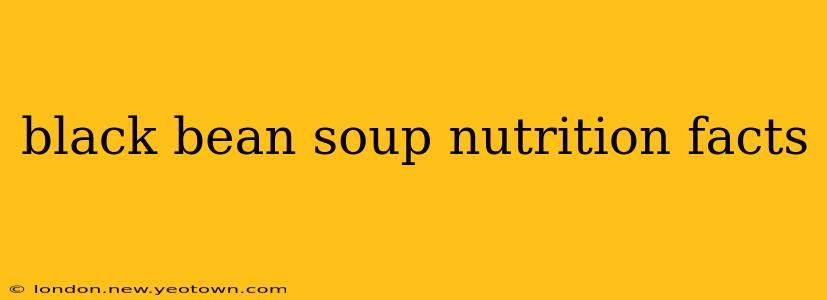Black bean soup, a culinary staple across cultures, is more than just a delicious and comforting meal. It's a nutritional powerhouse packed with vitamins, minerals, and fiber, making it a fantastic addition to a healthy diet. But just how nutritious is it, really? Let's dive into the fascinating world of black bean soup nutrition facts.
Imagine this: a chilly evening, the aroma of simmering spices filling your kitchen, and a warm bowl of hearty black bean soup waiting to be savored. This isn't just a meal; it's an experience. And with each spoonful, you're nourishing your body with a potent blend of nutrients.
What are the nutritional benefits of black bean soup?
Black bean soup boasts an impressive nutritional profile. The foundation, black beans, are exceptionally rich in protein, fiber, and various essential vitamins and minerals. Depending on the recipe, the soup can also include vegetables like onions, carrots, and bell peppers, further boosting its nutritional value. These additions contribute additional vitamins, minerals, and antioxidants, enhancing the soup's overall health benefits.
Let's break it down:
-
High in Protein: Black beans are an excellent source of plant-based protein, crucial for building and repairing tissues, supporting immune function, and keeping you feeling full and satisfied. This makes black bean soup a perfect meal for vegetarians, vegans, and anyone looking to increase their protein intake.
-
Excellent Source of Fiber: Both black beans and many vegetables used in the soup are high in fiber. Fiber aids digestion, promotes gut health, helps regulate blood sugar levels, and can contribute to weight management.
-
Rich in Antioxidants: Many vegetables commonly added to black bean soup are rich in antioxidants, which protect your cells from damage caused by free radicals. Antioxidants are linked to a reduced risk of chronic diseases.
-
Good Source of Vitamins and Minerals: Black bean soup often contains a good amount of iron, folate, potassium, and vitamin K, all essential for various bodily functions. For instance, folate is crucial during pregnancy, while potassium supports healthy blood pressure.
-
Low in Fat: Compared to many other soups, black bean soup is relatively low in fat, making it a heart-healthy choice. However, the fat content can vary depending on the recipe, particularly if it includes ingredients like bacon or heavy cream.
How many calories are in a bowl of black bean soup?
The calorie count of black bean soup can vary significantly based on the recipe. A typical serving (around 1.5 cups) can range from 200 to 350 calories. Factors influencing the calorie count include:
- Type of broth: Using a low-sodium broth keeps the calorie count down.
- Added ingredients: Cream, cheese, or bacon can significantly increase the calorie content.
- Serving size: Larger portions naturally mean more calories.
Always check the nutritional information for specific recipes to get an accurate estimate.
Is black bean soup good for weight loss?
Because of its high fiber and protein content, black bean soup can be a valuable asset in a weight-loss diet. The fiber keeps you feeling full for longer, reducing overall calorie intake. The protein also contributes to satiety and helps maintain muscle mass during weight loss. However, mindful portion control is still important, as even healthy foods can contribute to weight gain if consumed in excess.
What are the potential drawbacks of eating black bean soup?
While black bean soup is generally very healthy, some individuals may experience:
- Gas and bloating: The high fiber content can cause digestive discomfort in some people. Gradually increasing your intake of black bean soup can help your body adjust.
- Interactions with medications: Black beans contain certain compounds that can interact with some medications. Consult your doctor if you have concerns.
- High potassium levels: Individuals with kidney problems need to monitor their potassium intake. Black beans are relatively high in potassium, so moderation is key in these cases.
How can I make my black bean soup even healthier?
You can enhance the nutritional value of your black bean soup by:
- Adding more vegetables: Incorporate a wider variety of vegetables, such as spinach, corn, or zucchini.
- Using whole grains: Consider adding brown rice or quinoa to boost the fiber content.
- Reducing sodium: Use low-sodium broth or homemade broth to control sodium intake.
- Avoiding excessive oil or fat: Minimize the use of oil or fat during preparation.
Black bean soup offers a delicious and nutritious way to enjoy a healthy and satisfying meal. Its versatility allows for countless variations, catering to different tastes and dietary needs. With its abundance of vitamins, minerals, fiber, and protein, it’s a true culinary champion, deserving a place in your regular meal rotation.

